
Kathmandu, officially the Kathmandu Metropolitan City, is the seat of federal government and the most populous city in Nepal. As of the 2021 Nepal census, there were 845,767 inhabitants living in 105,649 households and approximately 4 million people in its surrounding agglomeration. It is located in the Kathmandu Valley, a large valley surrounded by hills in central Nepal, at an altitude of 4,344 feet above sea level.

The politics of Nepal functions within the framework of a parliamentary republic with a multi-party system. Executive power is exercised by the Prime Minister and their cabinet, while legislative power is vested in the Parliament.
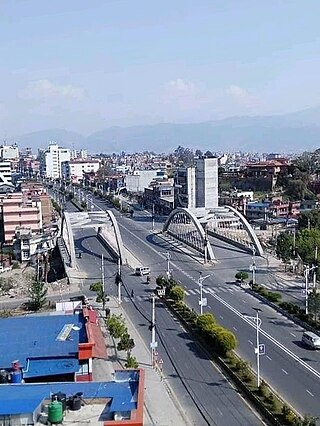
The economy of Nepal is a developing category and is largely dependent on agriculture and remittances. Until the mid-20th century Nepal was an isolated pre-industrial society, which entered the modern era in 1951 without schools, hospitals, roads, telecommunications, electric power, industry, or civil service. The country has, however, made progress toward sustainable economic growth since the 1950s. The country was opened to economic liberalization, leading to economic growth and improvement in living standards when compared to the past. The biggest challenges faced by the country in achieving higher economic development are the frequent changes in political leadership, as well as corruption.

Mount Everest, known locally as Sagarmatha or Qomolangma, is Earth's highest mountain above sea level, located in the Mahalangur Himal sub-range of the Himalayas. The China–Nepal border runs across its summit point. Its elevation of 8,848.86 m was most recently established in 2020 by the Chinese and Nepali authorities.

Nepal, officially the Federal Democratic Republic of Nepal, is a landlocked country in South Asia. It is mainly situated in the Himalayas, but also includes parts of the Indo-Gangetic Plain. It borders the Tibet Autonomous Region of China to the north, and India to the south, east, and west, while it is narrowly separated from Bangladesh by the Siliguri Corridor, and from Bhutan by the Indian state of Sikkim. Nepal has a diverse geography, including fertile plains, subalpine forested hills, and eight of the world's ten tallest mountains, including Mount Everest, the highest point on Earth. Kathmandu is the nation's capital and the largest city. Nepal is a multi-ethnic, multi-lingual, multi-religious, and multi-cultural state, with Nepali as the official language.

Birendra Bir Bikram Shah Dev, was King of Nepal from 1972 until his assassination in 2001. He was the eldest son of King Mahendra.
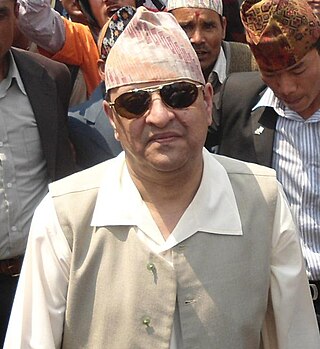
Gyanendra Bir Bikram Shah Dev was the last King of Nepal, reigning from 2001 to 2008. As a child, he was briefly king from 1950 to 1951, when his grandfather, Tribhuvan, took political exile in India with the rest of his family. His second reign, which began after the 2001 Nepalese royal massacre, was marked by constitutional turmoil. His brother King Birendra had established a constitutional monarchy in which he delegated policy to a representative government. The growing insurgency of the Nepalese Civil War during Gyanendra's reign interfered with the elections of representatives. After several delays in elections, Gyanendra suspended the constitution and assumed direct authority in February 2005, asserting that it would be a temporary measure to suppress the Maoist insurgency after civil governments had failed to do so. In the face of broad opposition, he restored the previous parliament in April 2006. He was deposed two years later by the first session of the Constituent Assembly, which declared the nation to be the Federal Democratic Republic of Nepal and abolished the 240-year-old Shah dynasty.

Miss Nepal is a national beauty pageant in Nepal. The winners are sent to Miss World, Miss Earth, Miss International.
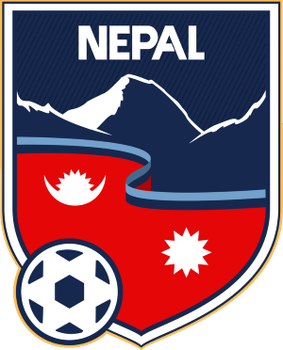
The Nepal national football team represents Nepal in International men's football, and is governed by the All Nepal Football Association (ANFA). A member of the Asian Football Confederation (AFC), the Nepali football team plays their home games at Dasharath Stadium in Kathmandu.
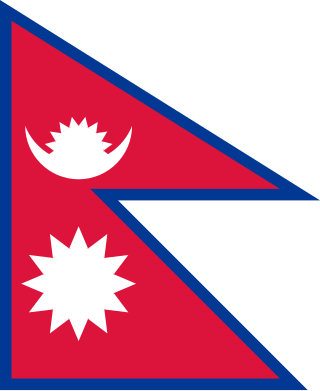
The Nepal men's national cricket team represents Nepal in men's International cricket and is governed by the Cricket Association of Nepal (CAN). They have been a Associate Member of the International Cricket Council (ICC) since 1996. Nepal were awarded Twenty20 International (T20I) status by the ICC in June 2014 until the 2015 ICC World Twenty20 Qualifier and earned One Day International (ODI) status in 2018.

Tribhuvan International Airport is an international airport located in Kathmandu, Bagmati, Nepal. It has a tabletop runway, a domestic terminal and an international terminal. As the country's main international airport, it connects Nepal to over 40 destinations in 17 countries.
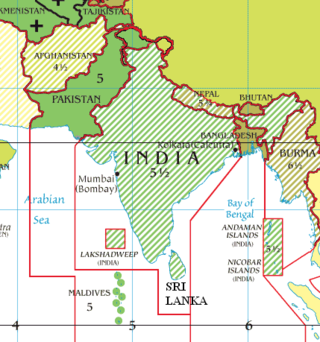
Nepal Standard Time (NPT) is the time zone for Nepal. With a time offset from Coordinated Universal Time (UTC) of UTC+05:45 all over Nepal, it is one of only three time zones with a 45-minute offset from UTC.

Religion in Nepal encompasses a wide diversity of groups and beliefs. Nepal is a secular nation and secularism in Nepal under the Interim constitution is defined as "Religious and cultural freedom along with the protection of religion and culture handed down from time immemorial." That is, "The state government is bound for protecting and fostering Hindu religion while maintaining "Religious" and "Cultural" freedom throughout the nation as fundamental rights.

Nepali are the citizens of Nepal under Nepali nationality law. The term Nepali usually refers to the nationality, that is, to people with citizenship of Nepal, while the people without Nepalese citizenship but with roots in Nepal are strictly referred to as Nepali-language Speaking Foreigners who are speakers of Nepali or any of the other 128 Nepali languages but are now foreign citizens or of foreign nationality bearing passports and citizenship of the foreign nation. It is also not generally used to refer to non-citizen residents, dual citizens, and expatriates.

Christianity is, according to the 2021 census, the fifth most practiced religion in Nepal, with 512,313 adherents or 1.8%, up from 2011 when there were 375,699 adherents or 1.4% of the population. Many informed observers have estimated that there are at least 1 million Nepali Christians. According to some Christian groups, there may be as many as 3 million Christians in Nepal, constituting up to 10% of the country's population. A report by Gordon Conwell Theological Seminary identified the Nepali church the fastest growing in the world. The vast majority of Nepali Christians are evangelical Protestants ; there is also a small Catholic population of roughly 10,000.

The Nepal women's national cricket team represents Nepal in international women's cricket. They made their international debut in the ACC Women's Tournament in Malaysia in July 2007. Nepal has been participating in various international tournaments since then.

Gadhimai festival is a Hindu festival held every five years in Nepal at the Gadhimai Temple of Bariyarpur, in Bara District, about 160 kilometres (99 mi) south of the capital Kathmandu, and about 7 kilometres (4.3 mi) east of the city of Kalaiya, near the Indo-Nepal border. The event involves large-scale sacrificial slaughter of animals, including water buffalo, pigs, goats, chickens, and pigeons, with the goal of pleasing Gadhimai, the goddess of power. People also make other offerings, including coconuts, sweets, and red-coloured clothes. The festival has been described as the world's largest animal sacrifice event or one of the largest. The Supreme Court of Nepal ordered an end to live animal sacrifices in 2019, but the order was "widely ignored".

Khadga Prasad Sharma Oli, commonly known as K. P. Sharma Oli or simply K.P. Oli, is a Nepalese politician who is serving as the prime minister of Nepal since 15 July 2024.

Sandeep Lamichhane is a Nepalese International cricketer, former captain of the Nepal national cricket team.


















